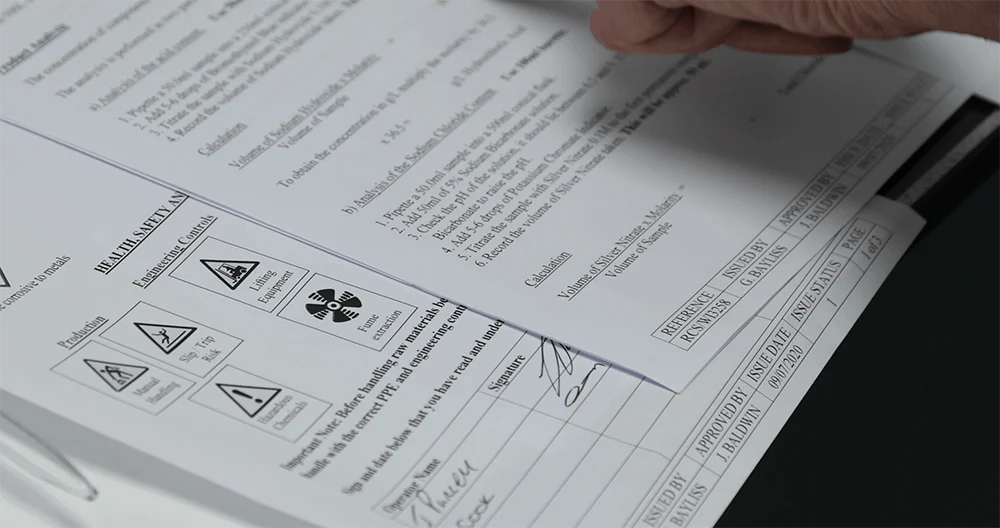A laboratory technician apprenticeship can help you find good opportunities in various industries that involve laboratory work.
In this post:
Overview – Earn While You Learn
Laboratory technicians have important roles in a huge range of sectors, including:
- Medicine
- Geology
- Oil extraction and refinery
- Forensics
- Agriculture
- Aquaculture
- Animal science
- Quality control
- Pharmaceutical research
- Product or material science R&D (research and development)
Whether you’re still pursuing your secondary education or are already employed, a laboratory technician apprenticeship programme can open doors for you in the field of science and technology. Becoming a laboratory technician apprentice can be a great opportunity to start a career in science.
Unlike internship programmes in other countries like the United States, the apprenticeship programmes in the UK are similar to regular employment.
Typically, apprentices are hired as full time regular employees after they pass the programme’s requirements and get certified. While working as an apprentice, you’ll get a salary along with other benefits, like sick pay, but usually these are a little lower than regular employees because you’re technically still being trained.

What You Will Learn
As a laboratory technician apprentice, you need to have a good background in science, particularly in laboratory experiments and research. You also need a strong foundation in biology, chemistry, physics, mathematics, statistics, and computer science.
If your ultimate goal is to become a scientist, but you need to work while studying, a laboratory technician apprenticeship can put you on the right path.
As an apprentice in laboratory science, you’ll learn practical skills that will allow you to carry out your job well. Your learning experience will be a combination of theoretical concepts and practical applications that are specific to your job.
During the apprenticeship, you’ll learn about:
- Laboratory safety protocols
- Carefully following laboratory procedures
- Laws or regulations about the industry laboratory
- Technical know-how about your work
- Data collection, presentation, and analysis
- How to appropriately communicate scientific findings
- Proper application of the scientific methods identifying problems and providing solutions
Typically, apprenticeships for laboratory technicians take about 18 months to 24 months to complete. However, it could be shorter if you already have previous job experience or you’ve already taken some subjects related to the apprenticeship.
Laboratory technician apprenticeships have modular learning components that typically include the following:
Year 1
Critical Skills Development
- Good Manufacturing Practice
- Introduction to Microbiology & Biotechnology
- Laboratory Safety
- Mathematics
- Fundamentals of Chemistry
- Computer Systems
- Laboratory Quality Systems
- Calibration Sciences
Year 2
- Stability and Sample Analysis
- Microbiology and Environmental Monitoring
- Instrumentation (Theory & Practical)
- Regulatory Affairs & Compliance
- Lean Labs
- Chemistry 2
- Analytical Lab Skills
- Workplace Based Learning
A degree is usually not required if you want to work as a laboratory technician. However, many scientific laboratory technicians do have a degree in science, or HND/HNC qualifications in scientific fields, such as the following:
- Biology
- Biomedical science
- Biotechnology
- Chemistry
- Environmental science
- Forensic science
- Pharmacology
- Physics
You’ll definitely have an advantage if you have an academic qualification because some large companies prefer hiring those with degrees, since it demonstrates you already have a strong foundational knowledge.
If you cannot afford to become a full time student and you want to immediately work after finishing your secondary education, undertaking an apprenticeship is a great option because it will allow you to earn an equivalent qualification while you train.

Course Entry Requirements
To qualify for an apprenticeship as a laboratory technician, you must have level 2 credentials in English and maths. You can then take the End-Point assessment.
Alternatively, if you have an education, your credentials must be entry level 3 in both maths and English. If you have permanent hearing disability, you need to have a British Sign Language qualification as an alternative to the English qualification.
Career Options When You’ve Completed Your Apprenticeships
Depending on the level or academic equivalent of your apprenticeship, like whether it’s a degree or non-degree apprenticeship, you have a wide range of options from which you can choose.
On average, a laboratory technician earns around £22,880 per annum, with a starting wage of £15,000. Once you’ve completed your laboratory technician apprenticeship, you’ll earn a certification such as the Level 3 subsidiary BTEC diploma in applied science. You can then work as a regular employee with full salary and benefits.
Depending on your academic qualifications and work experience, you may find work in various industries or be directly hired by the company that trained you as an apprentice.
One of the largest employers of laboratory technicians are pharmaceutical companies. Here, you can work as part of a team in the R&D department or in the quality control department for testing batches of pharmaceutical products.
Some of the common career opportunities for laboratory technicians are:
- Biotechnology laboratory technician
- Forensic laboratory analyst
- Medical laboratory technician
- Product R&D research assistant
- Product quality assurance technician
- Team leader technician
- Laboratory manager
Some of the biggest employers that can hire you include the following companies:
- Cosmetics companies
- Textile companies
- Metal processing companies
- Oil companies
- Hospitals, clinics, and public health organisations
- Government departments and government-funded institutions
- Environmental protection agencies
- Utility companies such as water distribution companies
- Law enforcement agencies and forensic science institutions
- Food manufacturing and processing companies
- Agricultural companies
- Pharmaceutical and chemical manufacturing companies
As an apprentice, and eventually as a full pledged professional, you should expect to carry out routine tasks and responsibilities that will quickly become second nature to you. Some of the work-related routines that you’ll perform as a lab technician include:
- Preparing experimental setups and research studies
- Assessing health and safety risks in the laboratory
- Collecting data and analysing these data based on samples
- Preparing biological specimens, reagents, solutions, or cultures
- Recording the observations, measurements, results, or findings
- Placing orders for supplies and equipment
- Safely disposing of the waste products or specimens
- Maintaining the cleanliness of the laboratory
How to Apply for a Lab Technician Apprenticeship
Apprenticeships in general are for three types of learners; those who left formal schooling, those who want to change careers, and those who want to progress in their careers.
The first step in applying is to know what your main goal for applying to an apprenticeship programme is. You must also know your interests and abilities. The second step is to find a company offering apprenticeships. The third step is to make sure you comply with the requirements. In some cases, you may also be required to take an aptitude test.
The fourth and final step is to simply fill out an online application form and cross your fingers!













